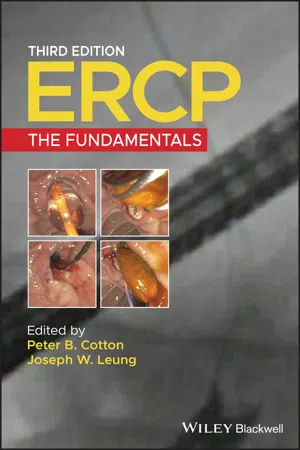
- English
- ePUB (mobile friendly)
- Available on iOS & Android
About this book
Provides the comprehensive knowledge required to perform ERCP safely and effectively
Authored by the very best in the field, this "how-to" guide to mastering the crucial yet complex gastrointestinal procedure called endoscopic retrograde cholangiopancreatography (ERCP) covers the entire range of both standard and advanced techniques, using a highly practical approach. It also places a strong emphasis on patient education, safety, and minimizing risks, offering "tips and tricks" and key points throughout to aid rapid understanding. The book is filled with over 250 illustrations
Covering ERCP preparation, techniques, clinical applications, and quality and safety, ERCP: The Fundamentals, 3rd Edition begins with chapters on "getting prepared, " including training and competence; facilities and equipment; risk assessment and reduction; sedation, anesthesia, and medications. It then covers "what can be done, " describing standard devices and techniques; intraductal therapies; ampullectomy; and reporting and documentation. Next it has chapters on "what should be done, " clinical applications of ERCP in acute cholangitis; peri-cholecystectomy; difficult bile duct stones; biliary pain; and numerous forms of pancreatitis. The book finishes with coverage of adverse events and how to ensure competent practice.
- Teaches all of the standard and advanced ERCP techniques
- Focuses on patient safety/comfort throughout
- Brilliantly-illustrated with endoscopic, EUS and radiologic images, and anatomical drawings
- Offers a step-by-step, practical approach to ERCP—highlighting potential technical and anatomical hazards
- Packed with tips and tricks boxes and key points boxes to assist comprehension
- 20 high-definition videos of ERCP performed by the experts, perfect to improve clinical technique
- Full reference to the very latest ASGE, ACG, ASG and UEGW guidelines throughout
Brought to you by world pioneers in endoscopy, ERCP: The Fundamentals, 3 rd Edition is an essential purchase for gastroenterologists and endoscopists of all levels.
Tools to learn more effectively

Saving Books

Keyword Search

Annotating Text

Listen to it instead
Information
Section 1
Preparation
1
Training and Assessment of Competence (Preparing the Endoscopist)
Key Points
- ERCP includes a range of mainly therapeutic procedures of different levels of complexity.
- Training involves both clinical and technical aspects.
- Hands‐on apprenticeship dominates, but various simulators can help.
- Competence should be assessed objectively, and the data made available to patients.
Background
- Who should be trained?
- What should be taught, and how?
- Who should teach?
- How are training and competence assessed?
- What level of performance is acceptable?
Who Should Be Trained?
What Should Be Taught, and How?
Levels of Complexity
Progressive Training
Table of contents
- Cover
- Table of Contents
- List of Contributors
- Introduction: Developments in ERCP over 50 Years
- Section 1: Preparation
- Section 2: Techniques
- Section 3: Clinical Applications
- Section 4: Quality and Safety
- Index
- End User License Agreement
Frequently asked questions
- Essential is ideal for learners and professionals who enjoy exploring a wide range of subjects. Access the Essential Library with 800,000+ trusted titles and best-sellers across business, personal growth, and the humanities. Includes unlimited reading time and Standard Read Aloud voice.
- Complete: Perfect for advanced learners and researchers needing full, unrestricted access. Unlock 1.4M+ books across hundreds of subjects, including academic and specialized titles. The Complete Plan also includes advanced features like Premium Read Aloud and Research Assistant.
Please note we cannot support devices running on iOS 13 and Android 7 or earlier. Learn more about using the app